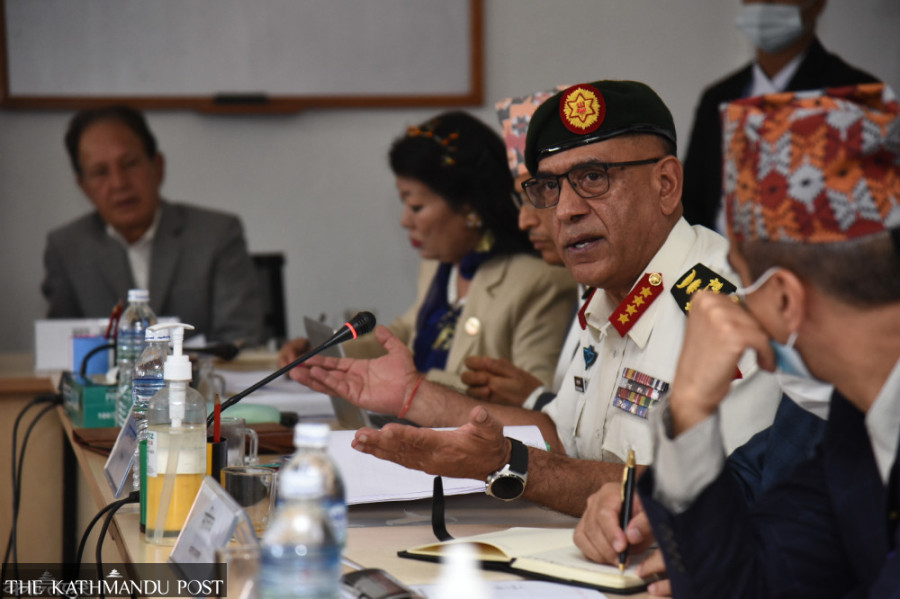National
House panel grills army chief, foreign minister on SPP
Orders government to write to the US saying Nepal is not part of SPP. Sharma claims 2019 army letter was sent with government nod, Nepal is not part of any military alliance.
Binod Ghimire
With a parliamentary committee launching an investigation into Nepal’s purported participation in the State Partnership Program of the United States government, the political parties are accusing each other of approaching the US to enrol Nepal into the programme.
The International Relations Committee of the House of Representatives summoned Minister for Foreign Affairs Narayan Khadka and Chief of the Army Staff Prabhu Ram Sharma on Friday, a day after a leaked letter showed Nepal Army had made a request to the US government to participate in the SPP. Of the three letters dispatched on different dates, the first one leaked on Thursday was sent on October 27, 2015. CPN-UML Chairperson KP Sharma Oli was prime minister then.
During the House committee’s meeting, the leaders from the UML and the Nepali Congress made every effort to pin the blame on each other. UML lawmaker Pradeep Gyawali, who is also a former foreign minister, asked Sharma to answer which government and prime minister had authorised the army to write the letter.
“There are confusions over which government gave the authorisation to write the letter and who was the prime minister then,” Gyawali said. Sharma, however, didn’t specifically answer who was the prime minister then. He said the letter was written on the stated date after receiving government approval.
The letter undersigned by then-Nepal Army chief Rajendra Chhetri also says the request for joining the National Guard State Partnership Program was made as authorised by the Nepal government. “Three letters were written. There is nothing to hide about it,” Sharma said. “It was done with government approval.”
Despite the army confirming the authenticity of the letter and the date of its issuance, the UML leaders made every attempt to dismiss its validity. The October 2015 letter addressed to Alaina B Teplitz, then US ambassador to Nepal, is printed except the date, 27th, which is handwritten, apparently by Chhetri. At the House committee meeting, UML Senior Vice-chairperson Ishwar Pokhrel asked about the authenticity of the letter, questioning the handwritten part.
Since it sometimes takes a few days to sign a letter, Sharma said the army has a practice of allowing the signatory to put the date on their own.
At the meeting, Minister Khadka claimed that the KP Oli-led government was at fault for not scrapping the partnership in 2019. “Instead it decided to keep the process on hold,” said Khadka.
Speaking in Parliament on Wednesday and Thursday, Gyawali and Pokharel, respectively, said their government had decided to keep the SPP process on hold after learning that it was a component of the US government’s Indo-Pacific Strategy.
“The problem would have been resolved had the government in 2019 scrapped it altogether. Why didn’t they do that then?” asked Khadka. “Our government is against Nepal joining the SPP. I would like to assure you that it won’t move ahead.”
He also claimed at the committee that the SPP chapter for Nepal has been closed and there was no need to stretch the matter further as the prime minister and Nepal Army have already said they are against it.
“The issue has been settled for now. It is against our national interest. Therefore, we won’t accept it,” Khadka told lawmakers responding to their queries. “We need not raise it in one way or the other. Now the chapter is closed as we have said we won't go for it.”
The international committee of the House took up the SPP issue after it created quite a storm in political circles. After the Army’s letter made it to the public domain, parties are trying to wash their hands of the issue shifting the blame on others.
Also speaking at the meeting, Sharma reiterated his institution’s Wednesday’s stance—that Nepal has not been part of any military alliance and will never be in the future.
“The letter that is in the public domain is authentic but nowhere does it say it is for a military alliance,” he said. “I have already conveyed to US officials that we cannot be part of any alliance. Let’s not have doubts.”
Sharma also assured committee members that there won’t be any such agreement during his upcoming US visit. He is travelling to the United States on June 27-July 1.
The three-hour meeting has directed Prime Minister Sher Bahadur Deuba to present himself before the committee to inform about his US visit scheduled for next month. The exact date of the visit, however, is yet to be made public.
“We want to hear from the prime minister himself about his US visit and the agenda he has,” said Pabitra Niraula Kharel, the committee chairperson. Although the ministers in the Deuba Cabinet have already claimed that there would be no agreement on the SPP or any other strategic deals, the committee is looking for commitments from Deuba himself.
The committee also has directed the Ministry of Defence, Foreign Affairs Ministry and Nepal Army to provide all the letters or agreements, if there are any, related to the SPP within seven days. It has also directed the Ministry of Foreign Affairs to submit the 2019 study report on the SPP prepared by a panel led by then foreign secretary Shankar Das Bairagi, who is currently the chief secretary.
“The committee also directs the Ministry of Foreign Affairs to write to the US government saying Nepal will not be part of the State Partnership Program anymore because the program falls under the Indo-Pacific Strategy,” reads one of the four directives.
“It also directs the Nepal government not to sign any controversial agreement that contradicts Nepal’s non-aligned foreign policy during Prime Minister Sher Bahadur Deuba’s upcoming visit to the United States.”




 10.12°C Kathmandu
10.12°C Kathmandu















